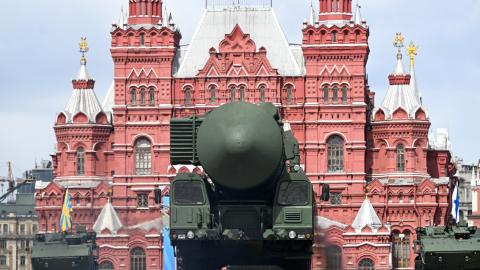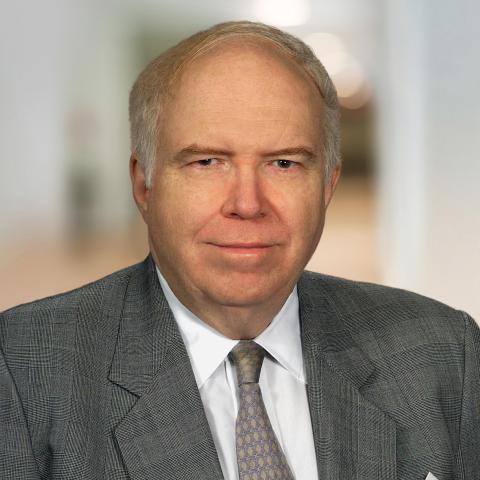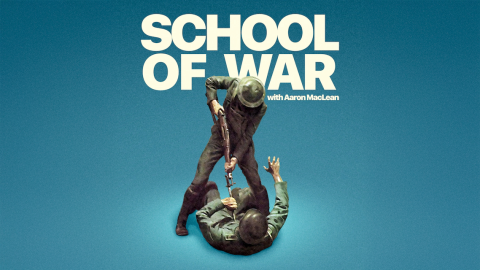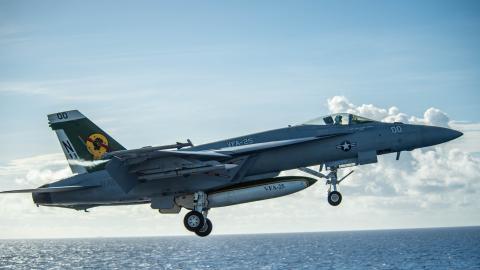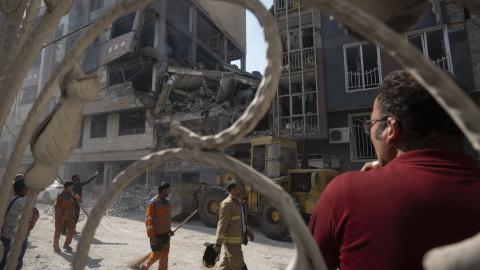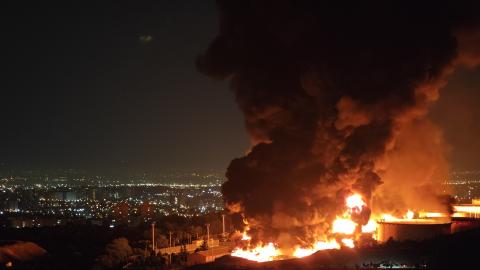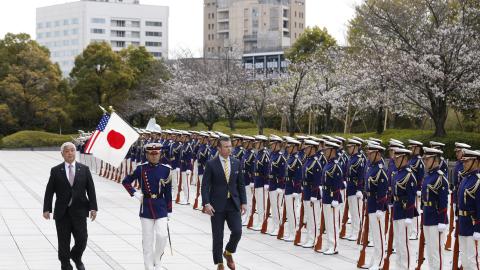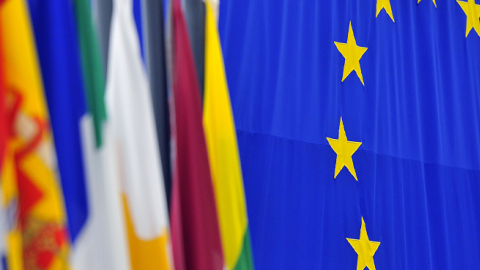As European citizens get ready to vote for representatives to the EU Parliament on May 25, a behind the scenes battle is quietly raging over who will replace President José Manuel Barroso and his team at the head of the European Commission, the EU’s executive body. Central to this will be the individual selected to succeed Catherine Ashton, the EU’s “High Representative” and Europe’s presumed Foreign Minister. Years of anemic economic growth and rising distrust in national and European institutions haven’t made the most fertile ground for transcending internal problems and pursuing an ambitious agenda abroad. But foreign policy challenges dominate the European agenda in 2014, so the coming negotiations over selecting Ashton’s replacement will be a test of how far Europe’s leaders are willing to go to overcome their divisions. Beyond the personal dimension, external events are forcing Europeans to come to grips with an unpleasant question: Does the European Union want to be a relevant player on the international stage?
EU foreign policy debates can be annoyingly arcane and inward-focused, but the situation in Ukraine has created both the urgency and the opportunity to begin a much-needed debate over Europe’s global role. Brussels and European capitals are sidelined by a crisis that sets Russia and a reluctant United States against each other right along Europe’s border. The mild sanctions package after the annexation of Crimea feels more like a concession that Europe needed to seem to be doing something to confront the Kremlin rather than a serious response. All along the edges of this crisis, Western nations have seemed more like spectators than players, and this has fed Putin’s determination to press on.
PUTIN TAKES EU DIPLOMACY MORE SERIOUSLY THAN EU LEADERS DO
The EU does not lack attractive instruments for dealing with international crises like this one. With 500 million inhabitants, Europe is the largest integrated free market area in the world. Its carrots and sticks approach to diplomacy, combining the threat of sanctions with the prospect of trade agreements, considerable aid budgets, and the promise of accession talks has historically been a motor for change in its Eastern neighborhood since the end of the Cold War. But domestic gloom, accession fatigue, and a lack of political attention have weakened support for European international action. The crisis in Ukraine actually started with Yanukovych’s refusal, against the wishes arguably of most Ukrainians, to sign a political and economic association agreement with the European Union that had been negotiated by Commission technocrats but left ignored and undefended by EU political leaders. While the bureaucracy was still running on autopilot, keeping up a steady diet of talks, few in Europe’s capitals seemed to notice anything amiss.
Interestingly, for supposedly being an old-school, hard-power Hobbesian, Putin was much more sensitive to the strategic effects of the trade agreement than Western leaders, and thus he put more effort into torpedoing it than European leaders put into promoting it. Putin didn’t have to ask how many divisions the European Union had. Where Europeans are interested in defending a stable periphery by promoting free markets and standards of public administration, Moscow sees a zero-sum game that could ultimately threaten its own regime.
As Edwards Lucas puts it in the latest edition of his book "The New Cold War:":http://www.amazon.com/The-New-Cold-War-Putins/dp/0230614345 “the prospect of prosperity, freedom, the rule of law and European integration in Georgia and Ukraine potentially challenge the authoritarian capitalist model in Russia.” When EU leaders finally realized this basic fact at the November 2013 Vilnius summit at which Ukraine’s President was supposed to sign on, it was already too late to do anything about it.
The main problem for Europe, then, is a political one, aggravated by the absence of a clear leader, supported by member states, to personify and give strategic coherence to Europe’s foreign policy instruments.
CHOOSING THE NEXT HIGH REPRESENTATIVE
EU foreign policy and defense decisions have to be unanimous, making for slow decision-making and lowest-common-denominators outcomes. The EU diplomatic service’s Twitter feed is replete with well intentioned but toothless expressions of concern over human rights abuses around the world. But whereas member states are unified in their rhetoric, they jealously guard their prerogatives when it comes to security and diplomatic matters, and even if they weren’t, reaching consensus on security matters between 28 countries with different interests and strategic priorities would still be hellishly complicated. David Cameron, for instance, is juggling a deep-rooted euro-skepticism within his own party, and Germany has been extremely reluctant to embrace an ambitious foreign policy or contribute to military operations beyond the narrow defense of economic interests.
The European External Action Service (EEAS), set up following the 2011 Lisbon Treaty, was intended to end the bickering and turf battles among various EU decision-makers. Under the tutelage of one figure, EU diplomacy was supposed to bridge differences among member states and give U.S. policymakers the unitary “phone number” that Henry Kissinger (allegedly) wanted.
The current High Representative, British Labour politician Catherine Ashton, was a controversial choice. She was ridiculed as a low-key and inexperienced figure with little interest in the job. Observers suspected she was picked for those very reasons, as large states were reluctant to relinquish sovereignty on foreign policy matters. The first years of Lady Ashton’s tenure were devoted largely to integrating a large staff culled from different institutions, who were used to elbowing each other out of the way to gain influence. Common career paths and an esprit de corps had to be established, for the 3,500 staff members and diplomats distributed between Brussels headquarters and some 140 EU delegations around the world. For Ashton, 2013 would be a better year than 2012. The Kosovo-Serbia deal she brokered, as well as her leadership over the Iran nuclear talks, raised her profile. And then along came the Ukrainian crisis, once again moving the European Union to the backseat again. Lady Ashton’s voice was once again lost amidst the din as great powers reclaimed their prerogatives. Despite having amassed a solid record bringing her organization into marching order, Ashton never really overcame the suspicions that burdened her nomination. But as her mandate comes to an end, Europe’s heads of states now have an opportunity to support a strong figure to pick up where she left off.
Nominating procedures for the European Commission are unnervingly opaque, giving plenty of ammunition to critics of the EU’s democracy deficit. Heads of states pick the presidents of the Commission and the European Council; each of the 28 countries then sends an appointee for a Commission portfolio. The final cast has to be validated by the European Parliament. These processes usually yield a complex balance between the interests of major states, the results of the European parliament elections, and the need to ensure broad political representation at the Commission. The nature of Europe’s polity makes this debate discreet for the moment, as observers mostly rely on rumors, hearsay, and trial balloons to test the waters for potential candidates. Any surprise candidate can pop up at the last second.
Still, certain names seem always to be in the running. Martin Schultz, the President of the European Parliament and the socialist candidate for Commission President, could get the High-Representative job as the result of a political compromise if, as expected, conservatives win the EU elections and thus the Commission presidency. However, more visible diplomatic figures are campaigning for the job. Radosław Sikorski, Poland’s Foreign Minister is allegedly the front-runner. The European Union would clearly benefit from having a heavyweight like Sikorski take the top diplomatic job. An Oxford graduate and former DC think tanker, Sikorski boasts networks that extend far beyond Eastern Europe. As Foreign Minister of a country constitutionally mandated to spend at least 1.95 percent of its GDP on defense, Sikorski has been a key voice in pushing Europeans to adopt a more confrontational stance against Russia, and he was the lead negotiator in the February 21 deal between Yanukovych and the Ukrainian opposition, leading to an end to the violence against the Maidan and, more importantly, the eventual demise of the President. Sikorski can be a blunt interlocutor: his warning, caught on camera, to Ukrainian opponents that they would “all be dead” if they didn’t sign the agreement is not your typical mealy-mouthed diplomatic statement.
Another potential candidate, Carl Bildt, Sweden’s Foreign Minister, was Europe’s special envoy for the conflict in Yugoslavia in the 1990s and is also a proponent of a more active EU foreign policy in the Eastern neighborhood. Both figures would offer a fresh break from the past and raise the High Representative’s profile. Neither is afraid to speak up or to make bold moves. Both come with a long track record as supporters of European foreign policy, and both are known Atlanticists. If one of these two were to land the job and carve out more autonomy when it comes to setting the agenda, the diplomatic balance of power could slowly tilt from the key national capitals toward Brussels. While predictions would be pointless, the long list of aspirants, which also includes socialist Dutch Foreign Minister Frans Timmermans and Slokavia’s Miroslav Lajcák, illustrates the renewed interest in the job.
MANY ITEMS ON THE AGENDA
As new security threats arise on Europe’s southern and eastern peripheries, Europeans are forced to set aside the complacency about strategic questions that had plagued the continent since the end of the Cold War. They have no choice: American leadership is shaky and uncertain. President Obama left his allies shorthanded on Syria and only agreed to intervene on Libya on the basis of “leading from behind,” outsourcing political leadership to Paris and London. Besides, even in the aftermath of Russia’s aggression against Ukraine, European security is not and will not be the center of U.S. security concerns as it was in the past. These days, beset by domestic gridlock, fatigue over foreign interventions, and the “pivot” to Asia, Washington is becoming a more distant relative with every passing day.
Europe’s first challenge is obviously the abrupt return of Russian imperialism. Europe’s inability to react swiftly to the events in Ukraine has seriously eroded its credibility. The talk coming from the Kremlin these days, of a “New Russia” that must defend the security of Russian-speaking minorities wherever they live, is understandably raising hackles all along Russia’s borders. Poland and the Baltic States have asked for military reassurance from allies, citing NATO’s Article 4, which call for consultations when a member feels threatened. Even Germany, which has privileged economic interests over strategic issues, is slowly reconciling itself to the necessity of adopting strong economic sanctions against Putin and his backers.
But the West’s response to the crisis will be tested in the long run by the allies’ ability to assist what is bound to be a difficult Ukrainian transition and to prevent a repetition of the failed Orange Revolution. Nothing would be worse than strategic attention-deficit disorder leading to a short-lived commitment to Ukraine. The EuroMaidan movement was first and foremost directed at the dismal political leadership that Ukraine has suffered from since independence. Russian troops stationed at the new Crimean border will act as a constant sword of Damocles hanging over Ukraine’s head, sabotaging its transition. Europeans and Americans can deploy a large range of financial and technical instruments to help Ukrainian leaders respond to the significant demands placed on their shoulders: economic aid, anti-corruption expertise, visa and trade facilitation, and more. Outside Ukraine, the Western response will be watched closely in countries, like Georgia and Moldova, that are also suffering from Russian pressure for their rapprochement with Europe. Energy is another domain where a unified policy would considerably increase Europe’s clout, as well as benefiting member-states individually. In a recent Financial Times op-ed, Poland’s Prime Minister Donald Tusk proposed creating a common mechanism for energy to reduce Europe’s dependence on Russian imports.
The showdown with Russia should not, however, diminish the gravity of the security issues awaiting Europeans south of the Mediterranean. Instability in Libya and the Sahel has sparked fears that radicalism will spread throughout North Africa. France has undoubtedly been one of the most ambitious European military player these last few years, under Presidents Sarkozy and Hollande, having led the way for sanctions against Iran, support for the Syrian opposition, and the fight against Islamism in Africa. French diplomats have been justifiably frustrated with the lack of enthusiasm their partners have shown for making contributions to military operations that Paris sees as benefitting its EU partners.
Any common diplomatic effort must be backed with reinforced military clout: Europeans will have to confront the continent’s manifest military weakness, which will necessitate reviving the Common Security and Defense Policy and opening a Transatlantic discussion on the future of NATO. In 2011, Asian defense spending exceeded that of Europe for the first time in modern history. No one should expect the European Union to match the United States in defense spending, but with an average of 1.7 percent of GDP devoted to defense spending (versus 4.1 percent for the United States), the gap between EU rhetoric and ambitions, on the one hand, and its limited deployment capacities, on the other, poses serious credibility problems.
These are some of the pressing issues that will appear at the top of the next EU High Representative’s agenda. But his most daunting task will be to convince 28 shareholders to trust him. At the end of the day, European capitals will have to gamble that a united voice will best serve the interests of the individual states when they face common challenges. Is Europe willing, in the face of external pressure, to take the necessary steps to fix these problems? We’ll start to find out in the coming weeks.
